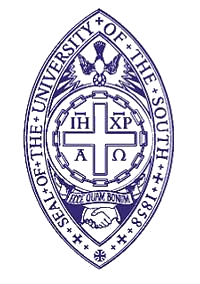Sewanee:The University of the South
 |
|
| Latin: Universitas Meridiana | |
| Motto | Ecce quam bonum et quam iucundum habitare fratres in unum. (Latin, from Psalm 133) |
|---|---|
|
Motto in English
|
Behold how good and how pleasant it is for brethren to dwell together in unity. |
| Type | Private |
| Established | 1857 |
|
Religious affiliation
|
Episcopal Church |
| Endowment | USD$336,524,119 |
| Chancellor | Samuel Johnson Howard |
| Vice-Chancellor | John M. McCardell Jr. |
| Undergraduates | 1,653 |
| Postgraduates | 184 |
| Location | Sewanee, Tennessee, U.S. |
| Campus | Rural, 13,000 acres (53 km²) |
| Colors | Purple and Gold |
| Athletics | NCAA Division III – SAA |
| Nickname | Tigers |
| Affiliations | |
| Website | sewanee |
 |
|
Sewanee: The University of the South, also known as Sewanee, is a private, residential, coeducational liberal arts college located in Sewanee, Tennessee, United States. It is owned by 28 southern dioceses of the Episcopal Church, and its School of Theology is an official seminary of the church. The university's School of Letters offers graduate degrees in American Literature and Creative Writing. The campus (officially called "The Domain" or, affectionately, "The Mountain") consists of 13,000 acres (53 km2) of scenic mountain property atop the Cumberland Plateau, with the developed portion occupying about 1,000 acres (4.0 km2).
The school was ranked 45th in the 2015 U.S. News & World Report list of liberal arts colleges. In 2016, Forbes ranked it 94th on its America's Top Colleges list. Sewanee is a member of the Associated Colleges of the South.
On July 4, 1857, delegates from ten dioceses of the Episcopal Church—Alabama, Arkansas, Florida, Georgia, Louisiana, Mississippi, North Carolina, South Carolina, Tennessee, and Texas—were led up Monteagle Mountain by Bishop Leonidas Polk for the founding of their denominational college for the region. The goal was to create a Southern university free of Northern influences. As one of its founders, Bishop James Otey of Tennessee put it: the new university will "materially aid the South to resist and repel a fanatical domination which seeks to rule over us."John Armfield, co-owner of Franklin and Armfield was by far the most influential in bankrolling the new university. His purchase of the site where the university continues to exist today and his promise of $25,000 per annum far exceeded any other donations and was considered a "princely offer" by a Nashville newspaper. Today, Sewanee downplays this eminent slave trader who played a central role in its establishment.
...
Wikipedia
